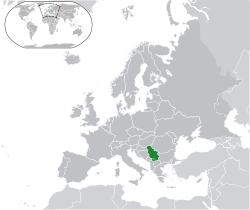Serbia’s New Government Sworn In
By Bojana Barlovac
New Prime Minister and 19 members of the government are scheduled to take their oaths of office on Thursday in Belgrade.
Almost three month after the May general elections, the Serbian parliament will hold a special session on Thursday where parliamentarians are expected to approve a new government.

After the vote, the new Prime Minister, Ivica Dacic, and members of his cabinet will take the oath of office to the sounds of the national anthem and in the presence of the ceremonial guard.
The new government, which consists of the Serbian Progressive Party, the Socialists and the United Regions of Serbia, will be headed by Dacic, leader of the Socialists and once the right-hand man of former Serbian strongman Slobodan Milosevic.
With 17 ministries and 19 officials to run them, the government will be the smallest that the country has seen since the multi-party system returned in 1990.
Aleksandar Vucic, acting head of the Progressives, has been put forward as Defence Minister and first Deputy Prime Minister, to be in charge of defence, security and the fight against crime.
Nikola Selakovic, 29, will be at the helm of the Justice Ministry, in charge of the fight against corruption.
The Foreign Minister will be Ivan Mrkic, former Serbian ambassador in Japan who was also Serbian ambassador in Cyprus under Milosevic in the 1990s.
The Progressives’ Goran Knezevic will be in charge of agriculture, forestry and water and Milan Bacevic will be the Minister for Natural Resources, Mining and Planning.
Bratislav Petkovic, who is not aligned to any party, will be the Minister for Culture, Information and the Diaspora.
Most of the new ministers graduated from Serbia’s private Megatrend University, owned by Mica Jovanovic, a high-ranking official of the Socialist Party.
Megatrend Professor Zorana Mihajlovic will be Minister for Energy, Development and Environment while Alisa Maric, who also teaches at Megatrend, will run the Youth and Sport Ministry.
The Socialists’ Zarko Obradovic, another Megatrend professor, who headed the Education Ministry in the previous government, will keep his post.
Other Socialists who will enter the new government include Slavica Djukic Dejanovic as Health Minister, Milutin Mrkonjic as Minister for Transport, and Jovan Krkobabic as Labour Minister.
Dacic announced that he would also perform the function of Interior Minister.
Mladjan Dinkic, the leader of the United Regions of Serbia, URS, will be given the Ministry of Finance and Economy.
Velimir Ilic will be in charge of contruction while the URS’s Verica Kalanovic will run regional development and local government.
Another URS official, Suzana Grubjesic, will be Deputy Prime Minister in charge of European Integration.
There will be two ministers from the ranks of Serbia’s ethnic Bosniak [Muslim] parties. Rasim Ljajic of the Social-Democratic Party of Serbia will head the Ministry for Internal and External Trade while Sulejman Ugljanin, leader of the Party of Democratic Action of Sandzak, will stay Minister without Portfolio.
The new government will also have four offices – for Kosovo, human and minority rights, churches and religious communities, and the diaspora.
This will be the 12th government since Serbia introduced a multi-party system.
